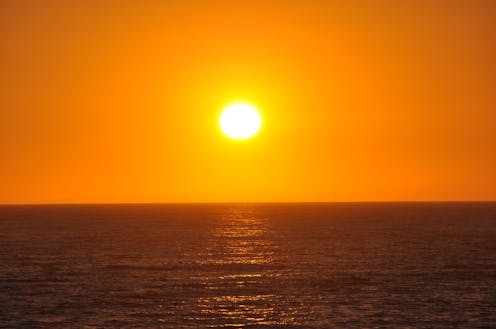here's why ocean temperatures are the hottest on record
- Written by Moninya Roughan, Professor in Oceanography, UNSW Sydney

Large swathes of the world’s oceans are warm. Unusually warm. The heat this year is likely to break records[1]. Since mid-March, the global average sea surface temperature is over 21℃ – the highest since satellite records began.
What’s going on? Climate change is the big picture – nine-tenths of all heat trapped by greenhouse gases goes into[2] the oceans. But there’s an immediate cause too: the rare triple-dip La Niña is over[3]. During this cycle, cooler water from deep in the ocean upwells to the surface. It’s like the Pacific Ocean’s air conditioner is running. But now the air conditioner is turned off. It’s likely we’re set for an El Niño, which tends to bring hotter, dryer weather to Australia.
When you run your air conditioner, you’re masking the heat outside. It’s the same for our oceans. La Niña brought three years of cooler conditions, while global warming continued apace.
Now we’re likely to see the heat roar back. If El Niño develops, climatologists estimate it could add[4] an extra 0.2℃ to global temperatures, which would nudge some areas past 1.5℃ of warming for the first time.
What are we seeing?
Wind patterns are changing over the eastern Pacific near Chile. These winds have stopped the upwelling of deep colder waters from cooling the surface. That’s why you can see[5] temperatures much higher than average in that area.
This is often the start of an El Niño cycle, which usually brings Australia fire weather – dry and hot – while damaging fisheries in Ecuador and Peru and bringing torrential rain to parts of South America.
But the age-old El Niño-Southern Oscillation cycle is happening amid climate change. That’s why it’s so hot across swathes of the world’s oceans.
Read more: Shifting ocean currents are pushing more and more heat into the Southern Hemisphere’s cooler waters[6]
Why do the oceans matter so much?
Ocean currents are a major carrier of heat around the globe, alongside atmospheric convection. Sun doesn’t pour down at the same rate everywhere. At the poles, it’s easier for sunlight to glance off, which is why they are colder. But the equator gets the full force of the sun, heating up air and water.
Ocean and air currents move this heat towards the poles. As the currents move south, heat mixes into the surrounding water. The East Australian Current carries warm water from the tropics southwards, distributing heat along south-eastern Australia. By the time the current reaches Hobart, it is typically a lot cooler.
Water can hold much more heat than air can. In fact, just the top few metres of the ocean store as much heat[7] as Earth’s entire atmosphere. The oceans are slower to warm up, and slower to cool down. By contrast, the temperature of our atmosphere is much more mercurial and can change rapidly.
Heat gets into the ocean at the surface, as you’d expect, as that’s where sunlight warms water directly as well as warm winds transferring heat. Over time, this heat is mixed with the rest of the ocean. Most of the extra heat is going into the top two kilometres of seawater, but there’s warming all down the water column. On average, the oceans are four kilometres deep.
How much energy? A startling study[8] suggests the earth system trapped roughly 380 zettajoules of extra heat from 1971-2020 – with the oceans taking up 90% of that. That’s a truly enormous number, the equivalent of 25 billion nuclear bombs.
Our research has found[9] warmer currents – where heat is concentrated – are pushing further south, towards Antarctica.
Is that why my ocean swims are so warm this month?
Surprisingly, the answer is “not necessarily”. Local dynamics always play a role. And so do our own expectations.
In Sydney, many people have been surprised by how warm the water has felt when they dare a dip this month. The long-term trend of warming oceans plays a role. But more important is how long water can hold heat.
That warm Sydney dip is due to the oceans holding their heat from summer and autumn. Air temperatures might fall to 22℃ while the ocean is at 21℃. But that’s actually quite common in April – cooler air and warmer water. For a person swimming the contrast makes the ocean feel warm compared to the air, particularly if a breeze is blowing.
This is partly why global warming is hard to grasp. We experience the weather and climate directly, by our lived experience. What matters more is the big picture we are seeing. And that, based on the intense heating off Latin America, is a real worry.
Read more: El Niño is coming, and ocean temps are already at record highs – that can spell disaster for fish and corals[10]
References
- ^ break records (climatereanalyzer.org)
- ^ goes into (climate.nasa.gov)
- ^ is over (www.bbc.com)
- ^ could add (www.bbc.com)
- ^ you can see (www.ospo.noaa.gov)
- ^ Shifting ocean currents are pushing more and more heat into the Southern Hemisphere’s cooler waters (theconversation.com)
- ^ as much heat (climate.nasa.gov)
- ^ study (essd.copernicus.org)
- ^ has found (theconversation.com)
- ^ El Niño is coming, and ocean temps are already at record highs – that can spell disaster for fish and corals (theconversation.com)

















